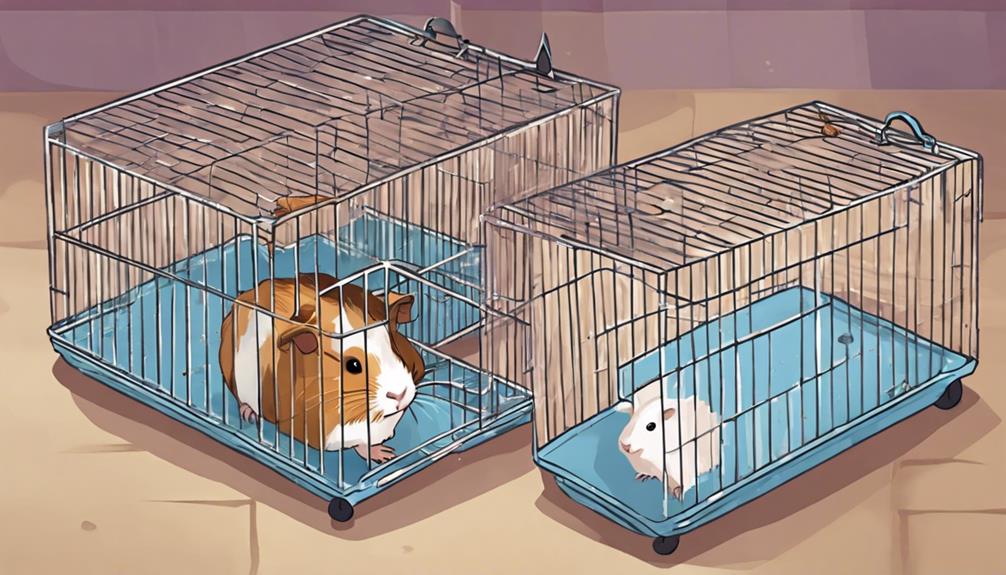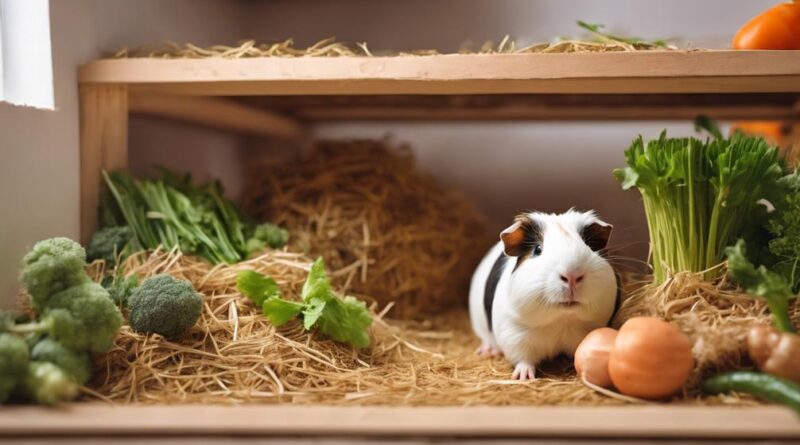7 Effective Ways to Prevent Guinea Pig Diseases
You think your guinea pig secretly enjoys playing host to a variety of diseases? Think again. By implementing simple yet effective strategies, you can keep your furry friend healthy and happy for years to come.
From proper cage cleaning to maintaining optimal temperature, these seven preventive measures will ensure your guinea pig stays in top-notch condition.
But, there's one crucial aspect you might be overlooking that could make all the difference in safeguarding your pet's well-being.
Proper Cage Cleaning
To maintain a healthy environment for your guinea pig, regularly clean its cage. Cage hygiene is crucial in preventing diseases. Start by removing any uneaten food, soiled bedding, and droppings daily. Use a small handheld vacuum or a dustpan and brush for easy cleanup. Once a week, change all the bedding entirely. Guinea pigs are sensitive to ammonia, so be sure to use bedding that controls odors and moisture well.
When cleaning the cage, it's essential to use a disinfectant safe for small animals. Opt for pet-safe disinfectants to avoid any harmful chemicals that could harm your guinea pig. Dilute the disinfectant according to the instructions on the label and thoroughly clean all surfaces inside the cage. Pay close attention to areas where your guinea pig tends to urinate more frequently. Allow the cage to dry completely before placing your pet back in its home.
Regular cage cleaning not only prevents diseases but also keeps your guinea pig comfortable and happy. A clean environment reduces the risk of bacterial and fungal infections. By maintaining proper cage hygiene and using suitable disinfectants, you're taking proactive steps to ensure your guinea pig's well-being.
Balanced Diet and Nutrition
Ensuring your guinea pig receives a balanced diet and proper nutrition is essential for its overall health and well-being. Proper nutrition can help prevent various diseases and ensure your furry friend lives a long and happy life.
- Quality Hay: Guinea pigs need unlimited access to fresh Timothy hay to aid digestion and wear down their teeth.
- Fresh Vegetables: Include a variety of fresh vegetables like bell peppers, cucumbers, and leafy greens in their daily diet for essential vitamins and minerals.
- Pellets: Provide high-quality guinea pig pellets to ensure they receive necessary nutrients like Vitamin C and fiber.
- Feeding Schedule: Establish a consistent feeding schedule to maintain their digestive health and prevent obesity.
- Nutritional Supplements: Consider adding Vitamin C supplements to their diet if they aren't getting enough through their food.
Regular Veterinary Check-ups
Regularly scheduling veterinary check-ups for your guinea pig is crucial to maintaining its health and detecting any potential issues early on. Guinea pigs are prone to various health problems, and regular check-ups can help ensure they receive the necessary care to stay healthy. During these visits, veterinarians can provide important veterinary advice on proper nutrition, exercise, and overall care for your furry friend.
In addition to general advice, veterinarians can create a personalized vaccination schedule for your guinea pig. Vaccinations are essential in preventing diseases that can be harmful or even fatal to your pet. By following the recommended vaccination schedule, you can protect your guinea pig from illnesses that are common in their species.
Moreover, regular veterinary check-ups allow for the early detection of any health issues. Guinea pigs are masters at hiding signs of illness, making it challenging for owners to notice when something is wrong. Veterinarians have the expertise to identify subtle symptoms that could indicate a more significant problem. By catching these issues early, treatment can begin promptly, increasing the chances of a successful recovery.
Clean Bedding and Litter
Maintaining a clean bedding and litter environment is essential for your guinea pig's health and well-being. Proper hygiene practices can help prevent diseases and ensure a comfortable living space for your furry friend.
Here are some key tips for effective bedding maintenance and litter disposal:
- Choose the right bedding: Opt for safe and absorbent bedding materials such as paper-based or hay-based options to keep your guinea pig cozy and dry.
- Spot clean daily: Remove any soiled bedding or litter to maintain cleanliness and freshness in your guinea pig's living area.
- Deep clean weekly: Completely change and clean the bedding at least once a week to prevent the buildup of bacteria and odors.
- Monitor moisture levels: Ensure the bedding remains dry to prevent mold growth and respiratory issues in your guinea pig.
- Proper litter disposal: Dispose of used bedding appropriately, following local waste disposal regulations to prevent environmental contamination and health hazards.
Safe Handling Practices
Practice safe handling techniques to protect both yourself and your guinea pig from potential injuries. When handling your guinea pig, it's essential to support their body properly to prevent them from feeling insecure and potentially injuring themselves. Make sure to scoop them up gently, supporting their chest and hindquarters to avoid unnecessary stress on their delicate bodies.
Proper grooming is another crucial aspect of safe handling practices. Regularly brushing your guinea pig's fur not only keeps it clean and free of tangles but also helps you bond with your pet. Additionally, inspecting their nails and trimming them when needed can prevent overgrowth and related health issues.
Socialization plays a significant role in ensuring safe handling. Spending quality time with your guinea pig helps them become accustomed to human interaction, making handling easier and less stressful for both of you. Start by sitting near their cage and talking softly to them, gradually progressing to gentle petting and handling as they become more comfortable with your presence.
Monitoring Water Quality
To ensure the health and well-being of your guinea pig, monitoring the water quality in their habitat is crucial. Proper hydration is essential for your guinea pig's overall health, making it vital to pay close attention to the quality of the water they consume.
Here are some key points to consider when monitoring the water quality for your furry friend:
- Regular Water Testing: Conduct routine water testing to check for impurities, bacteria, or contaminants that could harm your guinea pig if ingested.
- Clean Water Dispenser: Ensure that the water dispenser is clean and free from algae buildup or residue that could affect the water quality.
- Fresh Water Daily: Replace the water in your guinea pig's dispenser with fresh, clean water daily to prevent any bacterial growth or stagnation.
- Hydration Levels: Monitor your guinea pig's water intake to ensure they're drinking enough water to stay hydrated, especially during hot weather or if they're unwell.
- Filtered Water: Consider using filtered water for your guinea pig to remove any potential harmful substances present in tap water that could impact their health negatively.
Quarantine New Guinea Pigs

When introducing new guinea pigs to your existing group, it's essential to quarantine them to prevent the spread of potential diseases. Quarantine is a crucial step in ensuring the health and well-being of all your guinea pigs. Before introducing companions to your current group, set up a separate area for the new arrivals. This space should be located away from your other guinea pigs to minimize the risk of disease transmission. Keep the new guinea pigs in quarantine for at least 2 weeks to observe them for any signs of illness.
During the quarantine period, make sure to provide the new guinea pigs with fresh food, water, and bedding regularly. Monitor their behavior, appetite, and overall health closely. It's important to avoid direct contact between the quarantined guinea pigs and your existing group to prevent the potential spread of any diseases.
Once the quarantine period is over and the new guinea pigs show no signs of illness, you can start socialization methods to introduce them to your existing group. Begin by placing their cages near each other so they can see and smell one another. Gradually, allow supervised interactions to help them get used to each other's presence. By following these steps, you can help prevent the spread of diseases and ensure a smooth introduction of new companions to your guinea pig family.
Maintaining Optimal Temperature
To ensure the health and well-being of your guinea pigs, it's crucial to maintain an optimal temperature in their living environment. Proper temperature regulation is essential for keeping your guinea pigs healthy and happy. Here are some key tips to help you maintain the right temperature for your furry friends:
- Monitor the Temperature: Use a thermometer to regularly check the temperature in your guinea pigs' living area.
- Provide Adequate Bedding: Choose bedding materials that help regulate temperature, such as fleece or paper-based bedding.
- Avoid Extreme Temperatures: Keep your guinea pigs' habitat away from drafts, direct sunlight, heaters, or air conditioning vents.
- Use Snuggle Safe: Consider using a Snuggle Safe heat pad during colder months to provide additional warmth.
- Offer Cooling Options: In warmer weather, provide ways for your guinea pigs to cool down, such as ceramic tiles or frozen water bottles wrapped in a towel.
Frequently Asked Questions
Can Guinea Pigs Get Diseases From Other Animals in the Household?
Yes, guinea pigs can get diseases from other animals in the household due to cross-contamination risks. Household pet interactions can expose guinea pigs to potential illnesses. It's essential to keep guinea pigs separate from animals that may carry diseases to prevent transmission.
Always wash hands thoroughly after handling different pets and avoid sharing items between them. By being cautious, you can help protect your guinea pig's health.
How Often Should I Trim My Guinea Pig's Nails to Prevent Health Issues?
To keep your guinea pig healthy, trim their nails every 3-4 weeks. Use pet nail clippers or a nail file for the task.
Make sure to handle your guinea pig gently during the process. Good hygiene habits, like keeping their living area clean, also help prevent health issues.
Regular nail trimming prevents overgrowth and potential injuries. By maintaining a consistent nail care routine, you can keep your guinea pig happy and healthy.
Are There Any Natural Remedies or Supplements That Can Help Prevent Diseases in Guinea Pigs?
If you're looking to enhance your guinea pig's health, consider herbal remedies and supplements. These can complement your preventative care routine by providing additional nutrition and support.
When used in conjunction with a balanced diet and regular veterinary check-ups, these natural options may help boost your guinea pig's overall well-being. Remember to always consult with your vet before introducing any new herbal remedies or supplements to your guinea pig's diet.
What Signs Should I Look Out for to Detect Early Symptoms of Common Guinea Pig Diseases?
To spot early signs of common guinea pig diseases, pay attention to changes in behavior like lethargy or loss of appetite. Keep an eye out for symptoms such as sneezing, coughing, or discharge from the eyes or nose. Regular vet check-ups are crucial for early detection.
Make sure your guinea pig's diet meets their nutritional needs and provide ample exercise. Prevent parasites by keeping their living environment clean and using appropriate preventative treatments.
Are There Any Specific Toys or Activities That Can Help Keep Guinea Pigs Healthy and Prevent Illnesses?
To keep your guinea pigs healthy and prevent illnesses, include enrichment activities and exercise toys in their routine. These items provide mental stimulation and physical exercise, promoting overall well-being.
Additionally, consider adding dietary supplements to their diet to boost their health benefits. By incorporating these elements into their daily lives, you can help ensure that your guinea pigs stay happy and healthy for years to come.
Conclusion
By following these 7 effective ways to prevent guinea pig diseases, you can ensure your furry friends stay healthy and happy.
Remember to:
- Regularly clean their cage
- Provide a balanced diet
- Schedule vet check-ups
- Use clean bedding
- Handle them safely
- Monitor water quality
- Quarantine new arrivals
- Maintain optimal temperature.
Your guinea pigs will thank you for taking such good care of them!
